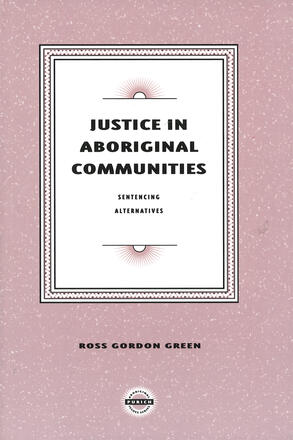Acknowledgements
Illustrations
Introduction
Part 1: Conventional and Aboriginal Systems of Justice and Sentencing Compared
1. Sentencing Law and Practice in Canada
2. An Historical Overview of Aboriginal Perspectives on Justice
3. Aboriginal People and the Canadian Justice System
The Circuit Court as Absentee Justice System
The Misinterpretation of Aboriginal Offender Information and Behaviour at Sentencing
4. Opportunities for Community and Victim Participation and Sentencing Discretion in Conventional Sentencing
Opportunities for Community and Victim Participation
Community and Victim Participation in Diversion Outside the Court System
The Role of Appellate review in Sentencing Discretion
Jury Sentencing in the United States
A Search for New Approaches
Part 2: Case Studies
5. The Sentencing Circle
Status of Circle Recommendations in the Criminal Code
Criteria for Circle Sentencing
Deterrence through Circle Sentencing
Circle Sentencing at Hollow Water, Manitoba
Circle Sentencing at Sandy Bay, Saskatchewan
6. The Elders' or Community Sentencing Panel
The Elders Justice Advisory Council at Waywayseecappo, Manitoba
7. The Sentence Advisory Committee
The Sentence Advisory Process at Pelican Narrows, Saskatchewan
8. The Community Mediation Committee
The Justice Committee at the Mathial Colomb Cree Nation, Pukatawagan, Manitoba
Part 3: Evaluation and Thoughts for the Future
9. The Development and Impact of Community Sentencing and Mediation Initiatives
10. Post-Colonialism, Legal Pluralism, and Popular Justice
Post-Colonialism
Legal Pluralism
Popular Justice
11. Justice and Policy Issues Raised by Community Sentencing and Mediation
The Court's Supervisory Role in Community Sentencing Approaches
Political Influence and Judicial Independence
Financial Infrastructure or Volunteer Support?
Expansion of Community Sentencing Approaches
The Potential Effect of Statutory Reform and Appellate Sentencing Review on the Development of Community Sentencing
Policy Implications of Expanded Community Sentencing
12. Conclusion
Notes
Index
